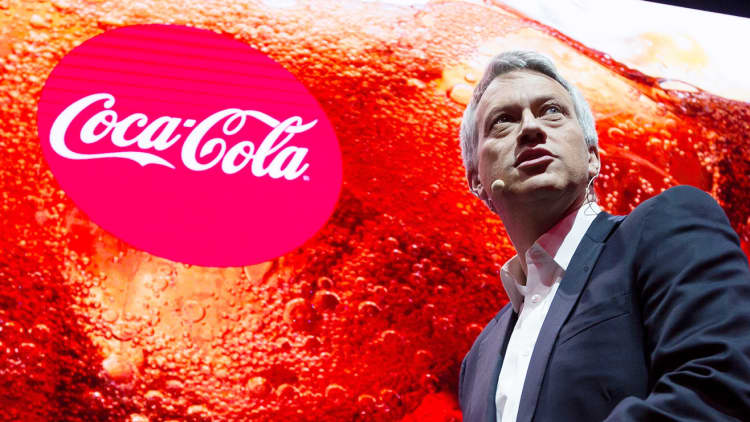
Coca-Cola shares tumbled Thursday — and were on track for their worst day since the Great Recession — after the company gave a gloomy projection for its 2019 earnings.
Its stock price sank 7.5 percent in afternoon trading. Its worst daily loss in the past decade was on Oct. 9, 2008, when shares fell 8.67 percent.
The soft drink giant reported fourth-quarter earnings that met expectations, but it forecast that 2019 earnings per share could rise or fall by 1 percent — meaning less than the $2.08 per share it earned in 2018. Wall Street's consensus projects were earnings of $2.23 per share in 2019.
CEO James Quincey told analysts that currency fluctuations, Fed rate hikes and changing tax rates are responsible for the weaker outlook.
"Clearly that is leading to an EPS growth that is not what we aspire to," he said.
The global beverage giant has been battling currency headwinds, which it said hurt its fourth-quarter earnings by 10 percent. Rising import and transportation costs last year forced it to raise prices on its soft drinks in North America.
Here's what Coke reported compared with what Wall Street was expecting, based on a survey of analysts by Refinitiv:
- Earnings per share: 43 cents vs. 43 cents expected
- Revenue: $7.06 billion vs. $7.04 billion expected
Net sales dropped 6 percent to $7.06 billion, but still topping expectations of $7.04 billion. The company attributed the revenue decline to the impact of currency and refranchising its bottling operations, a project that is nearly done.
Sales of its sparkling soft drinks dropped 1 percent during the fourth quarter, despite its popular Coca-Cola Zero Sugar drinks once again are seeing double-digit growth.
Unit case volume for the quarter was unchanged from last year. Quincey attributed the flat volume to focusing on "value over volume" in some markets. Unit case volume in North American sales dropped 1 percent as the effects of the midsummer price increases finally hit the consumer, he said on the conference call.
"So it's a little softening," he said. "But then it started to pick up, so we started the year well."
Additionally, economic conditions in certain emerging markets, like Central America, offset growth in India and Central and Eastern Europe. For example, in another emerging market, Argentina, unit case volume declined by double digits as the country entered a recession in the second half of 2018.
The soda giant reported fiscal fourth-quarter net income of $870 million, or 20 cents per share, up from a loss of $2.75 billion, or 65 cents per share, a year earlier. Coke said that freight costs negatively impacted its earnings this quarter. Deputy CFO John Murphy, who will take the reins from retiring CFO Kathy Waller in March, told analysts the company does not expect to see the same year-over-year freight increases in the U.S. as in 2018.
Excluding items, Coke earned 43 cents per share during the quarter, in line with the consensus estimates from Refinitiv.
For fiscal year 2019, Coke is forecasting organic revenue growth of 4 percent.
"We are being prudent in our outlook for 2019 given the multiple reductions in global economic growth outlook for 2018 and our own experiences in some of the emerging and developing markets," Quincey said.
Murphy also said the company expects higher interest expenses, based on the timing of the Fed rate hikes, and more significant currency headwinds in the first half of 2019, rather than the back half of the year.
As global soda consumption declines, the beverage giant has been expanding beyond its core soft-drink business. Last year, it acquired British chain Costa Coffee for $5.1 billion, one of its six acquisitions in 2018. Quincey told analysts on the quarterly conference call that it closed the Costa deal Jan. 3, several months ahead of schedule.
With the deadline for Brexit approaching without a clear outcome in sight, Quincey said that the business has contingency plans in place for Costa and the rest of its U.K. businesses.
"It's likely to only be a short-term disruption effect if indeed it ends up in that scenario, and we will manage through it," Quincey said.
Correction: This story was revised to correct the year Argentina fell into recession.


